Why Eat Organic, Bro?
Episode 9 is here!
Show Description:
There is a food revolution happening right now! If you’re on the fence about choosing organic food over conventional, it’s time to get empowered with facts and this is the perfect show to listen to. There’s no better time to take back your health and wellness than right now. Listen in as the EmPOWERment Couple takes you on a journey from the beginning of the organic movement, to the future of food.
Show Blog:
There’s a food revolution happening right now! For the first time in history, we experienced an organic seed shortage, and seed sales were halted to consumers altogether due to the pandemic. At the same time, we are seeing a surge in organic gardening. So, we are going to focus on the organic garden craze that is taking place and we’ll call them revolution gardens. We haven’t seen a surge like this since the 2008 financial crash. A whopping 8 million food gardeners revealed that 2009 was the first year they grew their own food. So with all change and challenges comes a silver lining and in these times we see consumers returning to real food.
We are going to go over the who, what, where, how, and why to buy, eat, and grow organic today! This episode is meant to make you rethink everything you know about food and empower you to make an informed choice with your precious food dollars. The vote you cast with your fork is one of the most profoundly impactful decisions you can make as a human on this planet.
But, if you’re like Mike when I met him, you might be thinking, “Why Eat Organic, Bro?” and I am here to share some wisdom with you, that I learned from being inside the good food movement since birth.
First, let’s play a game called Time Machine. Time Machine is a game Mike and I play when we need to determine our “why” and it’s usually to convince a part of ourselves that we will refer to as Bro, that’s the resistant lazy fucker that we all have inside of us hesitating changes even when we know they are good for us. So, Bro needs to be reminded of why. Let’s play this game here.
Instead of our time machine being a batwing Dolorian, ours is a rickety garden cart let’s take you back in time to different points in our agricultural history that show just how we arrived at where we are today. We will even jump into the future to forecast where we are heading. Along the way, we will help you see behind the scenes in the Organic Food Movement unlike anyone else can. It will involve sharing some stories, some facts, some science, and lots of laughter, because hey, that’s how we roll.
Next stop, the beginning of my organic food journey. See my parents were hippies that raised goats and built our house in a barn. But, they were also innovators and were some of the first certified organic farmers in the U.S. My father helped create and establish certification in California and will be on the show to share his story sometime soon.
Why did farmers need to go organic?
Farmers farmed organically or without synthetic chemicals for thousands of years before chemical companies introduced toxic chemicals and waste products that promised fewer weeds, fewer pests, and easier harvests. When we take this time machine way back in history we see Sumerians using sulfur 4,500 BC, and then 3,200 BC the Chinese using natural plant-based insecticide and the Greeks around 2,800 BC were using fumigants. But, it wasn’t until 1939, roughly 81 years ago, called DDT was introduced into the marketplace.
The 50s and 60s era was deceptively coined as the “green revolution.” Chemically-dependent farming was appealing because farming is hard work because you have incredibly long days and there are so many variables such as, bad seeds, bad weather, pest infestations, bad labor, soil health, and weed headaches that can cause failed crops. Then you have to factor in market changes, competitor pricing, and consumer needs. Farmers that chose to rely on chemicals for farming did so in the hopes that the chemical salesmen, oftentimes their close friends, would solve their problems, save them labor and earn them more money.
History can tell you that many of these things didn’t come true, in fact in 2019 we saw more conventional farmers transition to organic than ever before. According to a Mercaris report, the total certified organic field crop acres grew 13% in 2019, new field crop operations up 14%. The reason? Consumer demand. Today more than 82% of American households purchase organic products. At the end of the day, farming is a business and requires sales to survive.
Looking back in our time machine we can see that farmers were forced into coming up with a term to describe what food grown in tandem with nature should be called. 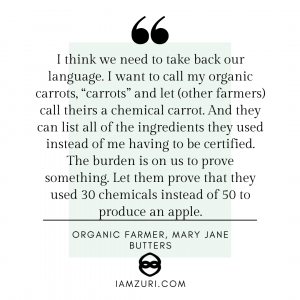 Conventional carrots are grown with a lot of chemicals and when tested 26 chemical residues are found on them Apples when tested have 47 chemicals found on them. These tests come from the USDA pesticide data program. These are simply the residues found not the total of chemicals used to grow these crops.
Conventional carrots are grown with a lot of chemicals and when tested 26 chemical residues are found on them Apples when tested have 47 chemicals found on them. These tests come from the USDA pesticide data program. These are simply the residues found not the total of chemicals used to grow these crops.
The recently released Organic Trade Association survey showed that the U.S. organic sector celebrated a stunning year in 2019, with organic sales in the food and non-food markets totaling a record $55.1 billion, “up a solid 5 percent from the previous year. Organic non-food (including textiles) sales totaled just over $5 billion for the first time, up a strong 9.2 percent. Both sectors easily outpaced the general market growth rate of around 2 percent for total food sales and of just 3 percent for total non-food sales.”
Who Started Organic?
In the 1940s a man named J.I Rodale began speaking about non-chemical farming. Rodale is the founder of the Rodale Research Institute and Organic Farming and Gardening magazine and is commonly regarded as the father of the modern organic farming movement. Rodale’s interest in organic farming was sparked by a British scientist, specifically an agriculturalist, named Sir Albert Howard. Sir Albert Howard spent years observing traditional systems in India. He also wrote passionately about the necessity of healthy soil and the use of natural methods like composting, soil health, and cover cropping for food production. As Rodale is often quoted, “Organic food isn’t a fad. It’s a return to tradition.”
By the 1970s consumers were demanding naturally produced foods without chemicals but not calling it organic. States began coming up with their own certification programs. In California, where we farmed it was CCOF.
Several years later in 1990, the Organic Foods Production Act (OFPA), passed as part of the U.S. Farm Bill, called for the establishment of the USDA National Organic Program (NOP) and National Organic Standards Board (NOSB), finally backing the “certified organic” claim with federal legislation. Then 12 years after the Organic Foods Production Act of 1990, the first national standards for organic production were passed in 2002.
What Is Organic?
Organic is food gr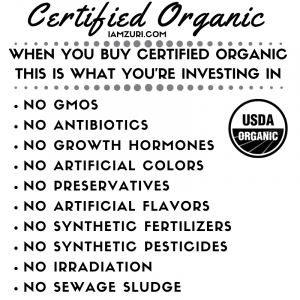 own without the use of toxic persistent pesticides, herbicides, antibiotics, growth hormones, sewage sludge, irradiation, GMO seeds, or fertilizers. When a food is processed to be sold as organic it cannot contain artificial preservatives, artificial colors, artificial flavors, or any of the chemical inputs mentioned in the product.
own without the use of toxic persistent pesticides, herbicides, antibiotics, growth hormones, sewage sludge, irradiation, GMO seeds, or fertilizers. When a food is processed to be sold as organic it cannot contain artificial preservatives, artificial colors, artificial flavors, or any of the chemical inputs mentioned in the product.
To understand this fully review this infographic and share it with your friends and family.
You’ll want to look for USDA certified organic seal. Review the differences between USDA Organic and Non-GMO Project Verified in this infographic. 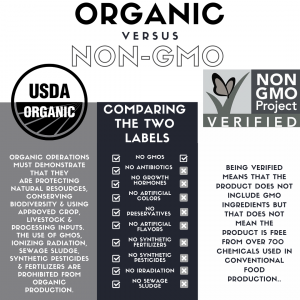
Why Organic?
We have followed polls, surveys, collected comments, and conducted surveys with our broader food movement allies and have found interesting information on why people do or do not eat organic. Learn more about the top 3 reasons why consumers are making this decision.
So, Why do people avoid purchasing organic?
The top 3 reasons people don’t purchase organic are:
- Too expensive
- Access
- Believe it’s a marketing scam
Our top three responses to that are:
- It’s an investment in your health. Which is what Rodale found out in his experimental farming. Pay the doctor, or you can pay the farmer.
- Everyone can grow food, it’s what our friend Ron Finley says: Growing your own food is like printing your own money.
- It’s likely the people that started that lie, were marketing experts for the chemical or biotech industry. The truth is there is no current label is as all-encompassing as USDA Certified Organic.
Why do people decide to change their lifestyle and eat organic?
The top 3 reasons are:
- Health scare
- Starting a family
- A results-based decision such as weight loss.
Why do people eat organic?
The top three reasons are:
- To avoid pesticides
- To avoid GMOs
- Organic is more nutritious
But, to really help you make an informed decision we want to highlight the top ten reasons WHY you should eat organic today. You can read the full blog here or review the top 10 reasons to eat organic.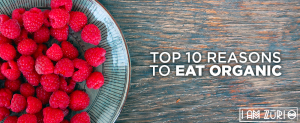
- Environmental Health & Climate Change
- Safe Drinking Water
- Health Risks
- Biodiversity
- Nutrition
- Avoid GMOs
- Good for Farmers and farmworkers
- Animal Welfare
- Hormones and Antibiotic usage
- Food security
Science On Organic Food Benefits:
When it comes to meat and milk, organic products can have about 50% more omega-3 fatty acids, a type of unsaturated healthy fat, than conventionally produced products, according to a 2016 study in the British Journal of Nutrition.
In a recent six-year study in the Journal of Agricultural and Food Chemistry, researchers found that organic onions had about a 20% higher antioxidant content than conventionally grown onions.
Another study showed that switching to an organic diet for one week significantly reduced a participating family’s pesticides in their urine. In fact, toxic pesticides dropped up to 95% after one week on an organic diet.
“The study, funded jointly by the European Framework 6 program and the Sheepdrove Trust, found that concentrations of antioxidants such as polyphenolics were between 18-69% higher in organically-grown crops. Numerous studies have linked antioxidants to a reduced risk of chronic diseases, including cardiovascular and neurodegenerative diseases and certain cancers.
Substantially lower concentrations of a range of the toxic heavy metal cadmium were also detected in organic crops (on average 48% lower).”
So, if you’re wondering why organic food is more expensive, we want to explain to you first why cheap food seems cheap but only if you don’t look at the hidden costs. You only pay for organic food once and it’s an investment in your health, your environment, and a healthy food future, but with cheap food, you pay for it at least 5 times. Read the full interview with Will Allen to learn more. 
How To Eat Organic?
So, now you might be willing to invest in yourself with some organic food, but let’s get into the how and address that number one complaint: COST.
Here 10 tips for buying organic on a budget! Read the full blog here or skim through the tips below.
- Grow Your Own Organic Food
- Cook Your Own Organic Food
- Pack Your Own Organic Food
- Find Your Local Organic Farmers
- Reduce Your Meat Consumption
- Buy Wholesale or In Bulk-
- Create Your Own Budget And Discount Plan
- Preserve! Don’t Waste Your Food
- Create Your Food Exchange Tribe With Local Foodies
- Use Organic Food As Your Preventative Healthcare
Where To Buy Organic?
Produce:
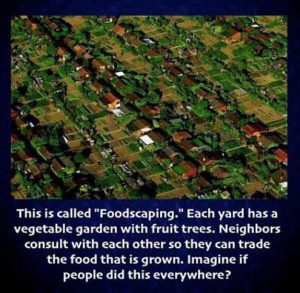 Get to know your local farmers. If you know your farmers you’ll know your food. You can join a CSA, community-supported agriculture, or go to your local farmers market. Find CSAs here.
Get to know your local farmers. If you know your farmers you’ll know your food. You can join a CSA, community-supported agriculture, or go to your local farmers market. Find CSAs here.
Affordable options:
Get involved in your community. There are programs where the community grows food for those that cannot afford it. There are also community garden projects. Schools often have an area that could house a school garden. Or you can start a “food scaping” experiment in your community.
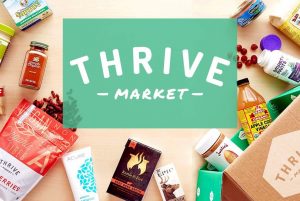 The best place to find packaged organic and removes the access issue is Thrive Market. Thrive Market is an online retailer that sells exclusively organic and natural foods and household goods at wholesale prices. With a Thrive Market membership, you can order your favorite health-food products for Costco prices and it gets delivered to your door as fast as Amazon Prime. What’s not to love about that? We order all of my pantry staples using their mobile app right from my iPhone and it saves me hundreds of dollars on organic food. You can use this link to get a free 30-day trial and get 25% off membership.
The best place to find packaged organic and removes the access issue is Thrive Market. Thrive Market is an online retailer that sells exclusively organic and natural foods and household goods at wholesale prices. With a Thrive Market membership, you can order your favorite health-food products for Costco prices and it gets delivered to your door as fast as Amazon Prime. What’s not to love about that? We order all of my pantry staples using their mobile app right from my iPhone and it saves me hundreds of dollars on organic food. You can use this link to get a free 30-day trial and get 25% off membership.
Let’s take one last trip in our time machine into the future. The future, if we continue to head in this direction is all organic. The chemical companies have lost their businesses from lawsuits against them for contaminating human health, the environment, and the human mind. People grow their own fresh food, eat in the community, and no longer eat blindly. When they buy food, it is the best food from local people, and eat out in celebration of local food. They don’t call it conventional or organic. They just call it good food. The people of the future are awake. They woke up to the realization that food is medicine and they enjoy the process of growing it, making it, sharing it, and loving it. And that is how it goes, bro!
If you want to learn more about the benefits of eating locally, read this blog here. 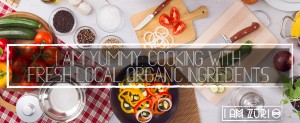 We hope you enjoyed this episode!
We hope you enjoyed this episode!
Disclaimer: This post includes an affiliate link to Thrive Market, and we will earn a commission if you purchase through these links. Please note that we’ve linked to Thrive purely because we use them and recommend to save money on organic products. There is no additional cost to you.




